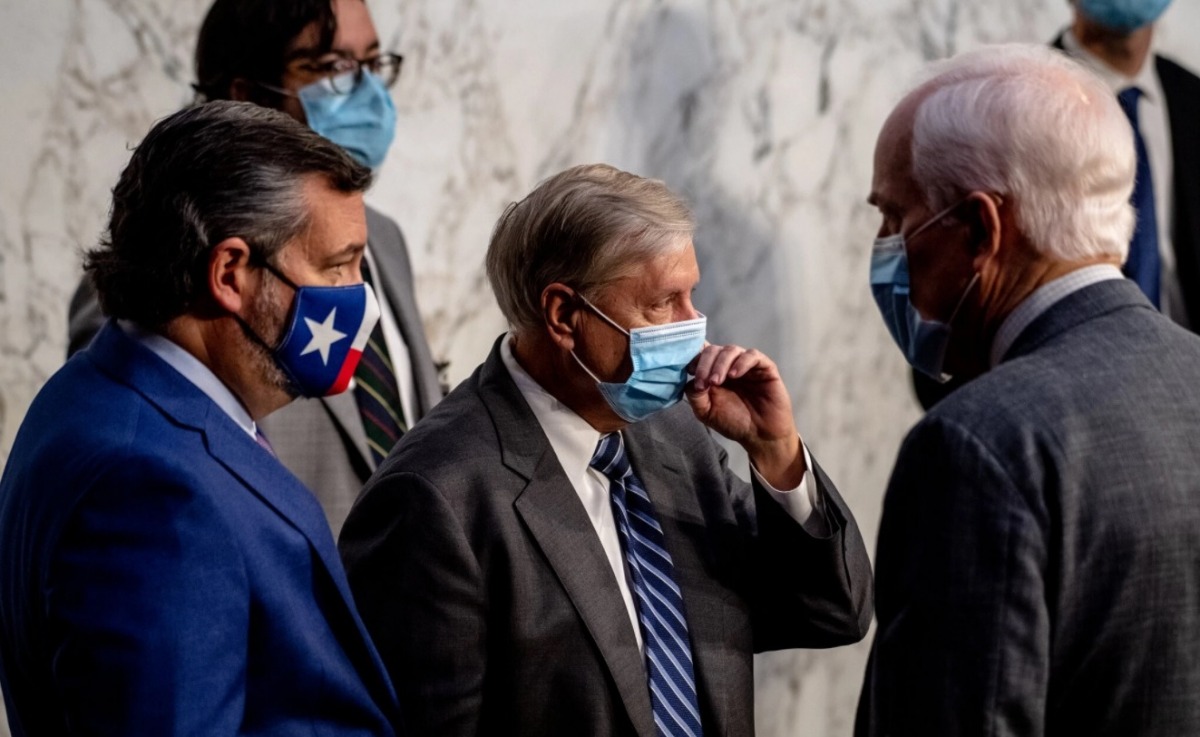The US presidential election fever and fears of President Donald Trump’s loss reached the Republican Senate, where the New York Times revealed that, nearly four years ago, Republicans in Congress avoided President Trump’s offensive statements and evaded them, and then began to distance themselves from it. . They also began to turn away from him for fear of what the newspaper called a “republican bloodbath” due to the party’s loss of its voters.
And the American newspaper said in a report prepared by Kate Edinson, that the transformation currently underway, less than three weeks before the elections, indicates that many Republicans believe that Trump is heading towards losing the elections next November.
The report emphasized that Republicans in Congress have evaded throughout Trump’s current presidential term from commenting on his incessant offensive statements, ignoring his biting tweets and his tendencies to mock party values, and did not move when he abandoned military allies and attacked American institutions, and raised racist concerns.
The report pointed out that the status quo in light of gloomy opinion poll numbers and the enthusiasm of Democrats that put their majority in the Senate at risk, Republicans on “Capitol Hill” began to publicly distance themselves from the president. And they seemed to conclude that Trump was heading towards losing the presidential election versus his Democratic rival, Joe Biden. So they began to strive hard to save themselves and work quickly to restore their reputation in the way of their struggle in the next stage for the identity of their party.

** The New York Times report
In this context, Senator Ben Sassi from Nebraska unleashed his speech about Trump during an event with his electors over the phone, on Wednesday, accusing the president of mocking the Corona pandemic and accusing him of “courting” dictators and supporters of white supremacy, which led to the widespread alienation of party voters. To the extent that it would cause a “Republican bloodbath”.
The New York Times said Senator Ted Cruz of Texas was repeating a warning using the phrase “a Republican bloodbath the size of a Watergate.” Senator Lindsey Graham of South Carolina, one of President Trump’s staunchest allies, predicted that the president might lose the White House.
Even Senator Mitch McConnell, a Kentucky Republican and majority leader, has been more forthcoming than usual in recent days about his disagreements with the president, dismissing his calls for the stimulus bill to go ahead. This was a reflection of the fact that Senate Republicans – who have seldom disagreed with the president on any major legislative initiative in four years – were unwilling to vote on the billions of dollars in federal aid that President Trump suddenly decided would be in his best interest to embrace.
“The voters are set to drive the final wedge between Republicans in the Senate and Trump,” said Alex Conant, a former aide to Senator Marco Rubio and a former White House spokesman. “It is very easy to live with events when you win elections and gain power. But when you are on the verge of historic loss, the eagerness to coexist with that fades,” he said.
The New York Times report went on to say: Republicans can stick with both the White House and the Senate, as Trump still has a strong grip on the party base, which may be the reason why some of those known to be more critical of the president, such as Sassy and Senator Mitt Romney from State Utah, they refused to be interviewed about their concerns.
Their recent behavior, however, provided an answer to the long-standing question of whether there is a point where Republicans can disavow President Trump, who has often said and done things that undermined their principles and mission? And apparently the answer to this question is: the moment when they fear Trump threatens their political existence.
And if some Republican senators have played down Trump’s chances of winning, this feeling may be mutual. On Friday, the president directed his latest Twitter attack on Senator Susan Collins of Maine, one of the Republicans’ most vulnerable incumbents. He is not interested in increasing her exposure, along with the party’s hopes of upholding the Senate.
In a statement released Friday, Romney attacked President Trump for not condemning the pro-QAnon conspiracy theory that the FBI has classified as a “domestic terrorist threat,” and said the president “eagerly exchanges the principles of this theory” in order to achieve victories. Electoral. ” It was his second stinging statement this week as a critic of Trump, although Romney also linked it to criticism of Democrats, saying both sides were responsible.
Yet Romney and other Republicans who have spoken of dire predictions or troubling phrases about Trump are still sticking to the president about what may be his last political decision before the election: the confirmation of Justice Amy Connie Barrett, a favorite of conservatives, on the Supreme Court. This split reflects the implicit bargain Republicans accepted in Congress over the course of Trump’s presidency, in which they tolerated his statements and inflammatory behavior, knowing that he strengthened many of their priorities, including appointing a conservative majority to the country’s highest court.
Despite this, the current hazy political environment has led to conflict, especially among Republicans whose political aspirations extend beyond the Trump presidency, to be on the front lines of reorienting the party.
Carlos Corbello, a former Republican congressman from Florida, who did not support Trump during the 2016 elections, said that when it turns out that he is just as politician as everyone else, here the concerns and maneuvers revolve around the future of the Republican Party, adding: “What we heard from Senator Sassi yesterday was … Beginning of that process. ”
In an interview, Corbello said his former colleagues had known for months that Trump would someday be “subject to the laws of political gravity” – and that the party would face the consequences of that.
He also said: “Most Republicans in Congress realized that this was not sustainable in the long term, and they were – people might call it pragmatic or opportunistic – keep their heads down and do what they need to do while they wait for what comes in the future.”
The report pointed out that it is unclear whether Republicans will seek to reorient their party in the event of the loss of the president, given that the Trump presidency showed the attractiveness of his incendiary political brand to a broad base of conservatives.
“He still has an enormous impact and will last for a very long time, and that’s what members care about,” said Brendan Buck, a former advisor to the last Republican speakers in the House of Representatives. He added that what Sassi and Cruz are aiming for is a last-ditch effort to preserve Republican control of the Senate.
The report went on to say that Republicans were angered by President Trump for putting their Senate candidate under pressure during the election campaign, as White Iris, a pollster and Republican advisor, said: “His weakness in dealing with the Corona virus has increased the number of swing seats in a situation we were not. We imagine it a year ago. ”
And in 2016, when Trump, then a candidate, seemed close to securing the party’s nomination, McConnell assured that if he threatened to harm them in the general election, they would “drop him like a hot rock.”
The report concluded that despite President Trump’s repeated public appeals to Republicans to adopt a large epidemic stimulus package, McConnell rejected it all, saying that his party’s senators would never support a package of this size. Consequently, the House Republicans revolted last weekend in a conference call with Mark Meadows, the White House chief of staff, warning that the huge spending deal might amount to a “betrayal” of the party base and distort their financial hawks’ credentials.
McConnell, who is preparing for re-election in Kentucky, last week, issued a personal rebuke to President Trump, when he told reporters that he had avoided visiting the White House since late summer due to his administration’s handling of the Coronavirus pandemic.






























